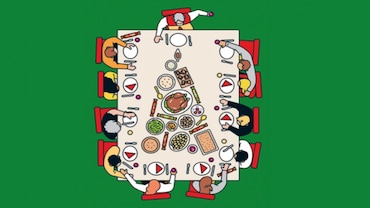- HOME
- /
- Features
- /
- Personalities
- /
In Conversation with Ankur Warikoo
Successful Internet entrepreneur, content creator and bestselling author, Ankur Warikoo speaks to RD about why money can be an emotional subject, how to overcome a scarcity mindset, the biggest mistakes he made in his own financial journey and more in this freewheeling conversation centered on his latest book Make Epic Money.
 Freepik
Freepik
Everyone has a relationship with money. It shapes most of our life choices, affects our relationships, even the one we have with our life. Why do we not talk about it?
Because we are told that everyone ought to have the same relationship with money. The world has defined that relationship – where we drive a fancy car, live in a fancy car, travel to fancy places, do not look at the price tag before buying. And if our reality isn’t that – we feel there must be something wrong in us to not have that relationship. So we chose to stay silent about it.
In your book, you mention how money and our relationship with it is driven by emotion. Why is money such an emotional topic?
Because it fuels desire. And desires fuel emotions. Money cannot buy happiness. But it certainly buys a lot of things that can give us happiness. The absence of money then leads to implied misery. And comparison amplifies that misery. Making us emotional about money – no matter how much we have it.

You quote Harari in your book, “Money is the only trust system … that can bridge almost any cultural gap ...” Despite, the integral role trust plays in money, most of us seem to not trust in our ability to make enough of it—we function with a scarcity mindset around it. And with so much shame and confusion around it, where do we begin to build an understanding of the language of money so that we can feel confident about money and managing it?
The best way? Start small and warm yourself up to how it feels. It is like any other new experience. None of us are born with any of the skills we have today. We learnt all of them – initially with caution, today with comfort. The more we did it, the more comfortable we got. That’s the same with money. Never invested in the stock market? Start small. Make that first investment. See how it makes you feel. Give it 3-6 months. Then take the next step. Then the next. Never invested at all? Start small. Set aside a percentage of your salary and drive that to another bank account. Don’t even invest that. Just keep it aside. See how that makes you feel. Give it 3-6 months. Then think of what to do with that money. Start. Just start!
How does one break out of the negative cycle between feeling intense financial anxiety or feeling guilt about becoming money-minded?
By finding a balance – which budgeting allows one to do. We often think money is about extremes. It is either spending all of it and not saving anything. Or saving all of it and not enjoying life. Truth is – money can beautifully manage everything. Because money doesn’t have colour. It is the same – whether paying rent, buying a phone, or investing in a mutual fund. In the book I talk about the 50:30:20 rule. From your salary, 50% should go towards your needs – your rent, EI, food, utilities, travel etc. Things you have to spend on, in order to live life. 30% goes towards your wants – that phone, that vacation, eating out, partying. Use your money to live life – you have worked hard for it. 20% goes towards your investments – the future self of yours – for the house down payment, or kid’s education, or your own marriage expenses, or your retirement.

Let’s take it back a step, where do we get our feelings about money? What shapes our relationship with money?
Our childhood – much like all of our other feelings. Whether we grew up with money or without it. How our parents treated money. How our parents treated those with or without money. How we saw people being treated with or without it.
When it comes to personal finance, there is so much advice ready available on the internet especially in wake of the current traffic of fin-influencers. And quite a bit of it is contradictory. And personal finance advice is not representative of every one. So, how do we evaluate what advice works for us?
By trying it out. Something will feel right. Something will call you out. You will drawn to it. For example – Make Epic Money already has supporters and haters. People are calling it the best book on money for India and people are calling it the book that just touches the surface. Everything out there will have supporters and haters. That is how it should be.
In the book, you have spoken about your family history with money, and how you found yourself repeating a similar history of sorts. Tell us about your own struggles with building a healthier, happier relationship with money?
For the longest time, I hated money. Because I thought it was the reason for our family’s state. It was the reason my parents fought, we struggled and we had unhappy days. So I grew up hating it, never acknowledging its importance and thinking I am above it. Because of that I disrespected money. Which is where things break down. When you disrespect money and what it can do for you, you start an ugly relationship with it. That’s what happened with me too, until the age of 39 when I saw what the absence of money could lead to. I am a changed person now!

What is the biggest mistake you have made with money?
Investing my money according to my echo chamber (startups in my chase). Until 2019 ALL of my money was invested ONLY in startups – leading me to be rich on paper but not with actual money.
Drawing from your experiences, what lessons can you share about how to establish consistent habits and building good financial discipline?
Three ways - Protect yourself first – by getting health and life insurance - Budget your monthly income to spend wisely - Invest 20% of your monthly income, mostly in mutual fund SIPs Bonus: Be patient
As someone who has seen a pendulum swing in your own financial health/prosperity, how does one walk away from operating from a place where we don’t place our sense of accomplishment on how much money we make?
By figuring how much is enough. Until we do not know how much we need in life, we are running a race without a finish line!






